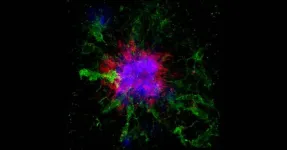(Press-News.org) MINNEAPOLIS/ST. PAUL (08/21/2023) — A new study from the University of Minnesota is the first to demonstrate the ability for gene therapy to repair neural connections for those with the rare genetic brain disorder known as Hurler syndrome. The findings suggest the use of gene therapies — an entirely new standard for treatment — for those with brain disorders like Hurler syndrome, which have a devastating impact on those affected.
The study was published in the Nature journal Scientific Reports.
Hurler syndrome, also known as mucopolysaccharidosis type I (MPS I), is a genetic disorder affecting newborns that leads to severe cognitive deficiencies and severe physical abnormalities. Genetic mutations disrupt synthesis of an essential lysosomal enzyme IDUA resulting in progressive brain damage. Death occurs by 10 years of age. Current treatments are inadequate — bone marrow transplants are dangerous and lifetime enzyme replacement fails to prevent progressive brain damage
U of M researchers evaluated a new form of gene therapy invented at the University of Minnesota — the PS gene-editing system — in mice with Hurler syndrome. This approach created very high, continuous levels of normal enzymes in the liver that can enter the brain via the circulatory system. Using high resolution resting-state functional MRI (rs-fMRI) — a safe, noninvasive and whole-brain activity imaging tool for diagnosis and post-treatment evaluation — investigators first identified neural networks that were disrupted. Next, they assessed the extent to which brain functions and connectivity were restored following the gene therapy.
The investigators observed the new approach of PS gene-editing produced normal enzymes from the liver that were able to sustain normal connections within specific neural networks. The technology needed for high resolution rs-fMRI brain connectome imaging was developed by Wei Zhu, a graduate student in the University’s Center for Magnetic Resonance Research.
Walter Low, a co-senior author and professor in the U of M Medical School, referred to the study as a breakthrough: “This is the first demonstration of a gene therapy that has corrected a neurological disorder resulting in the restoration of brain connectivity as confirmed by rs-fMRI.”
“A similar rs-fMRI approach as applied in this preclinical study should be translatable to the clinical setting and patients, especially for those with genetic brain disorders, and for examining the efficacy of brain network restoration and function after gene treatment,” said Wei Chen, a co-senior author and professor in the U of M Medical School and Center for Magnetic Resonance Research.
“The aeonic production of normal IDUA in the liver of mice with Hurler syndrome and the ability to traffic enzymes across the blood-brain barrier to correct abnormalities in the brain is a significant achievement,” said Chester Whitley, a co-author and professor in the U of M Medical School.
“This new approach will enable the monitoring of brain connectivity in other lysosomal disorders that affect brain function following gene-editing,” added Perry Hackett, a co-author and professor in the College of Biological Sciences.
Other participants in this study include Lin Zhang, an associate professor in the School of Public Health; Ying Zhang, an informatics analyst in the Minnesota Supercomputing Institute; Xiao-Hong Zhu, a professor in the U of M Medical School and Center for Magnetic Resonance Research; Isaac Clark, a graduate student in the Biomedical Engineering Program; and Li Ou, a former faculty member in the U of M Medical School.
This work was supported in part by funds from National Institutes of Health Grants [R01 NS118330, U01 EB026978, R01 MH111413, R01 NS133006 and P41 EB027061], the Susanne M. Schwarz Fund and the Hackett Royalty Fund.
-30-
About the University of Minnesota Medical School
The University of Minnesota Medical School is at the forefront of learning and discovery, transforming medical care and educating the next generation of physicians. Our graduates and faculty produce high-impact biomedical research and advance the practice of medicine. We acknowledge that the U of M Medical School, both the Twin Cities campus and Duluth campus, is located on traditional, ancestral and contemporary lands of the Dakota and the Ojibwe, and scores of other Indigenous people, and we affirm our commitment to tribal communities and their sovereignty as we seek to improve and strengthen our relations with tribal nations. Learn more at med.umn.edu.
About the College of Biological Sciences
The College of Biological Sciences at the University of Minnesota is one of two colleges in the United States dedicated to the biological sciences with undergraduate majors and graduate programs that cover the spectrum of life from molecules to ecosystems. Learn more at cbs.umn.edu.
About the School of Public Health
The University of Minnesota School of Public Health improves the health and wellbeing of populations and communities around the world by bringing innovative research, learning, and concrete actions to today’s biggest health challenges. We prepare some of the most influential leaders in the field, and partner with health departments, communities, and policymakers to advance health equity for all. Learn more at sph.umn.edu.
About the College of Science and Engineering
The University of Minnesota College of Science and Engineering brings together the University’s programs in engineering, physical sciences, mathematics and computer science into one college. The college is ranked among the top academic programs in the country and includes 12 academic departments offering a wide range of degree programs at the baccalaureate, master's, and doctoral levels. Learn more at cse.umn.edu.
END
PS gene-editing shown to restore neural connections lost in brain disorder
2023-08-21
ELSE PRESS RELEASES FROM THIS DATE:
Argonne receives funding to use AI and machine learning for nuclear physics research
2023-08-21
The U.S. Department of Energy (DOE) announced $16 million for 15 projects that will implement artificial intelligence (AI) methods to accelerate scientific discovery in nuclear physics research. DOE’s Argonne National Laboratory will lead two of those projects and be a collaborator on another.
These projects will use AI and Machine Learning (ML) tools and methods for nuclear physics experiments, simulation, theory and accelerator operation to expand and accelerate scientific reach.
“Artificial intelligence has the potential to shorten the timeline ...
Bloom studying impact of exposure to perfluoroalkyl substances on weight loss
2023-08-21
Michael Bloom, Associate Professor, Global and Community Health, received $158,900 from the National Institutes of Health for the project: "Impact of Exposure to Perfluoroalkyl Substances on Weight Loss: A Pilot Study of Hispanic Children with Overweight/Obesity Participating in a Community-based Weight Loss Intervention Program."
In this pilot study, Bloom is evaluating associations between exposures to perfluoroalkyl substances (PFAS) and weight lost during a 10-week weight loss intervention among Hispanic children with overweight and obesity. He and his collaborators will quantify the association between 12 different PFAS ...
Schintler & collaborators to study perceptions of efficiency & bias in algorithmic versus human peer review
2023-08-21
Laurie Schintler, Associate Professor, Schar School of Policy and Government, is set to receive funding for the project: "Perceptions of Efficiency and Bias in Peer Review: Algorithmic versus Human Decision Making."
This project is a collaboration between the Schar School of Policy and Government (GMU) and the Department of Sociology and Anthropology (CHSS-GMU). The investigators on the team include:
PI Laurie A. Schintler;
Co-PI Connie L. McNeely, Professor, Schar School of Policy and ...
McDonald to investigate privacy ecosystems among vulnerable populations
2023-08-21
Nora McDonald, Assistant Professor, Information Sciences and Technology, is set to receive funding from the National Science Foundation for the project: "Collaborative Research: SaTC: CORE: Medium: Beyond App-centric Privacy: Investigating Privacy Ecosystems among Vulnerable Populations."
Prior research shows that people who have privacy concerns may be reluctant to access medical services. This is especially true for vulnerable populations, such as those who because of their gender, race, ethnicity, socio-economic status, or other marginalizations are more susceptible to privacy risk. These risks go beyond individual apps ...
Acosta & Burls using weather model & geologic data to test tectonic mechanisms in intercontinental setting
2023-08-21
Paul Acosta, Postdoctoral Scholar, Atmospheric, Oceanic and Earth Sciences (AOES), and Natalie Burls, Associate Professor, AOES; Graduate Program Director, Climate Dynamics, received funding from the National Science Foundation for the project: "Collaborative Research: Using a weather model and geologic data to test tectonic mechanisms in an intercontinental setting: The Altai Mountains of Central Asia."
This project seeks to apply new advances in atmospheric and geosciences to ...
Ye receives National Science Foundation CAREER Award
2023-08-21
Jinwei Ye, Assistant Professor, Computer Science, received funding for the project: "CAREER: Towards Polarimetric Visual Understanding."
In this project, Ye will study how the way surfaces reflect polarized light can be used to help recognize objects more effectively.
Ye will address the following two questions: (1) How does the polarization of light change after interacting with various types of surfaces? (2) What can polarized light tell us about the kinds of objects that it has interacted with?
Addressing these questions can lead to significant improvements in machine vision systems by strengthening their capability to do geometric ...
Intermittent fasting improves Alzheimer’s pathology
2023-08-21
One of the hallmarks of Alzheimer’s disease is disruption to the body’s circadian rhythm, the internal biological clock that regulates many of our physiological processes. Nearly 80% of people with Alzheimer’s experience these issues, including difficulty sleeping and worsening cognitive function at night. However, there are no existing treatments for Alzheimer’s that target this aspect of the disease.
A new study from researchers at University of California San Diego School ...
New “bandit” algorithm uses light for better bets
2023-08-21
How does a gambler maximize winnings from a row of slot machines? This is the inspiration for the "multi-armed bandit problem," a common task in reinforcement learning in which "agents" make choices to earn rewards. Recently, an international research team led by Hiroaki Shinkawa at the University of Tokyo developed an extended photonic reinforcement learning scheme that moves from the static bandit problem towards a more challenging dynamic environment. This study was published July 25 in Intelligent Computing, a Science Partner Journal.
The success of ...
For men with erectile dysfunction, penile implants are usually covered by insurance – but not always
2023-08-21
August 21, 2022 – Implantable penile prostheses (IPPs) are an established treatment option for erectile dysfunction (ED), and are covered by insurance in about 80% of cases, reports a paper in the September issue of Urology Practice®, an Official Journal of the American Urological Association (AUA). The journal is published in the Lippincott portfolio by Wolters Kluwer.
However, some employer-sponsored insurance plans specifically exclude this guideline-recommended treatment option for ED, according to the new research by Dr. Mohit Khera, MD, MBA, MPH, of Baylor College ...
Adversities permanently change our brains
2023-08-21
Neuroscientists at Radboudumc show that adversities permanently change the functioning of the brain. Furthermore, an aberrant reaction of the brain to adversities is related to anxiety symptoms. This may have predictive value for the development of psychiatric disorders.
Your brain is shaped by the things you experience. That sounds logical, but can you really measure that? And what can you do with it? Neuroscientists at Radboud university medical center investigated the influence of adversities in life on patterns in the brain. They found remarkable associations that may have predictive value for the development of psychiatric disorders.
Special ...

